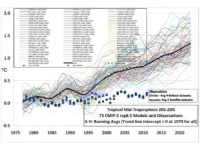Interesting. That first sentence is incorrect, as I've pointed out: According to these GISS temperatures, 1998 was beaten by 2005, 2007 and 2010.
Longview posted the data
here, and
this page has it in graphical form (covering 1880-2011). Even since 1998, the peaks (generally el nino years from what I've gathered)
have generally been getting hotter, and so have the lows (la nina years). Unfortunately I still haven't been able to get the data directly from the NASA site, which is a problem because
this blog seems to have different J-D values than those posted by Longview :doh
In any case here's a graph of the 5-year running average using that GISS data. Obviously when 2013's data is included it'll turn back up (2011 5-yr average), possibly even higher than the 2005 5-yr average since 2013 is shaping up hotter than 2012, and it won't be pulled down by the 2008 low.
View attachment 67155123
Here's
my calculations in Google docs for checking/correction, with a link to the graph site.
It's an interesting contrast with the 5-year average trend of Dr. Spencer's (also of NASA) lower troposphere data, I'll grant you. But so far the 2005-2010 trend (averages from 2003-2012) looks like less of a pause or downturn than the one in 89-94. A curious puzzle for the scientists, as your article notes, but hardly a crippling blow to the theory. And as Threegoofs and myself have noted, various other indicators do not share that anomaly or suggest a 'pause': Temperature trends in the lower troposphere have been generally upwards, ocean temperatures have also increased, sea levels have risen, Arctic sea ice has decreased,
Antarctic ice mass has decreased (though its
extent has increased overall) and so on.
########################
########################
The temperature
has risen - even that GISS data has the 2010s so far average hotter than the 2000s, which in turn were hotter than the 1990s - and while it's at the lower end of the uncertainty ranges, the predictions obviously
do not have an "unblemished history of failure." Didn't you read the posts I linked to, or even
Jack's last post? "Ed Hawkins, of the University of Reading, in Britain, points out that surface temperatures since 2005 are already at the low end of the range of projections derived from 20 climate models..."
Making things up is not a very good approach to debate :roll:
But with that correction in mind, the gist of what I'm seeing here seems to go something like this -
IPPC: Here, to the best of our current knowledge, are the uncertainty ranges of what we think is likely to happen.
Critics, a few years later: Hah! Actual observations have been at the lower end of your predictions, therefore the climate system can't be understood at all. Or at least not by those 90-odd percent of y'all!
You could of course show me where these best and brightest of AGW climatologists have ever claimed to be capable of "accounting for all of the natural variability"...? Obviously they would have been wrong if any of 'em
did claim that. But at least in that case your argument would not be a complete strawman, though it still would not show that climate systems and trends are as incomprehensible as you seem to imply.
Reality is not black and white, as I'm fond of saying over on my religious forums; too many folk, from
both sides of most issues, seem to have trouble with that fact. What we're looking at is not a dichotomy between "Climate scientists understand everything about the climate" or "They don't know what they're talking about." I doubt if any actual scientists even
claim the former, though I'll eagerly await your references. What we're looking at - those of us who understand shades of grey, at least - is something more along the lines of "Climate scienists already understand
enough of our climate systems and trends" or, as seems likely given that observations are towards the lower bounds of their estimates, "There are still important factors to understand."
Notice how once you remove the black-and-white thinking, it removes the suggestion that what climatologists are
confident of so far is as uncertain as the pieces they're still filling in? I attempted to explain this back in post #19. Seems you've failed Logic 101





